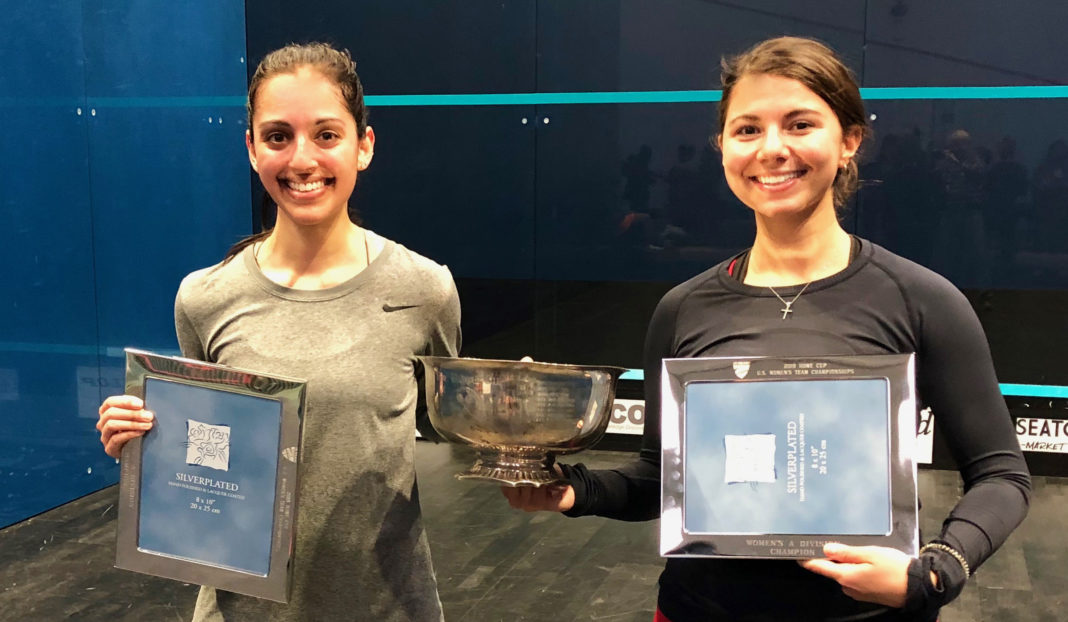Report courtesy of Matt Lombardi
The vitality of U.S. women’s squash was on full display this past weekend at the Seattle Athletic Club, where 220 players from around the country, comprising 44 teams in four skill-level divisions, did battle in the eighty-sixth rendition of the Howe Cup—the event formally known as the U.S. Women’s Team Championships.
View all results here and tournament photography here.
The tone of the tournament was set in an opening-round Division C match between the Seattle team Lucky Nicky and Philadelphia’s Philly Phantastiks. Seattle’s No. 1, seventy-seven-year-old local hero Mariza Ohlsson, was paired against a player sixty years younger, Melliah Santos from the SquashSmarts urban squash program. Santos eked out a 12-10 first game and looked in control after taking the second 11-6, but the indefatigable Ohlsson rose to the challenge, taking the next two games 11-6 and 11-8. Ohlsson kept the pressure high in the fifth, but Santos regrouped to triumph, 12-10.
It was a match those in attendance are unlikely to forget soon, but it was just one of the weekend’s highlights. Day Two saw the tournament’s greatest clash of talent when Laila Sedky, a nineteen-year-old Seattle-area phenom playing for the Chicago Rainbow Warriors, met Annelize Naude, the home club’s teaching pro. In the last year Sedky had reached the finals of the U.S. Junior Open and subsequently competed in her first pro tournaments, achieving a current ranking of 107 in the world. Naude, more than twice Sedky’s age, was a former world No. 13, but was nearly a decade removed from her last professional match. On the line was a place in the Division A final. Naude established the upper hand early, but Sedky’s relentless pace proved more and more effective at the match wore on. After trading games, Sedky triumphed in a fiercely contested, let-filled fifth, 12-10.
Sunday’s finals saw more battles of the generations, with youth usually, though not always, prevailing:
- In Division D, the Chi-town Boasters’ 4-1 win over the Boston D-vines featured a strong performance from 14-year-old Jamya Stewart, a student in the MetroSquash program.
- In Division C, Don’t Stop BALLieving, consisting of teenagers from New York’s StreetSquash, made it a clean 5-0 sweep over the only local finalists, the Seattle Sweet Shots.
- In Division B, Washington DC’s NCS Sharks snuck past the Boston Queen Bees 3-2, with each match closely contested and two going to five games.
- In Division A, Chicago couldn’t overcome forfeiting a match due to injury in the Howe Cup final, as it fell the San Francisco’s Olympic Club team, 3-2. Pia Trikha came back from 0-2 down against Emilie Kraft to win the deciding match.
The match of the tournament came at the No. 3 spot in the Division B final. With the teams tied at two matches apiece, Washington, DC’s Carole Grunberg, the reigning 60+ national champion, took on Boston’s Jimena Velarde, a player two decades her junior. From the start tensions were high and the points fiercely contested. Velarde looked in command after winning the first two games, 15-13 and 11-7, but Grunberg fought back, taking the third 12-10 and saving two match balls to win the fourth 15-13. Point after point, both players were making spectacular retrievals, extending rallies and pushing each other’s physical limits. In the fifth Grunberg took a 4-1 lead, but Velarde reeled her back in, eventually tying the score at nine all. Velarde fended off one match ball, but given a second chance at 11-10, Grunberg hit a crosscourt drop just out of Velarde’s reach to take the title. Grunberg looked stunned by her own performance as her teammates roared in jubilation.
San Francisco’s Olympic Club team—featuring Libby Eyre, Pia Trikha, Alexandra Sawin, Georgia Blatchford and Ripley Hartmeyer—becomes just the fifth west coast team to win the Howe Cup, and first from San Francisco or California. The 2019 Howe Cup celebrated the largest edition of the tournament hosted on the west coast, nearly doubling in size since Seattle last hosted in 2012.
With nearly 400 matches played on its eight courts over the course of three days, the Seattle Athletic Club was a hive of constant activity, managed with remarkable poise by the organizers and club staff. The triumphs and disappointments of competitive squash were played out over and over, with hundreds of fist pumps, even more groans of frustration, but, notably, never an angry word for an opponent or referee. The spirit of fierce but friendly competition spanned the generations in an event that did the sport proud.












